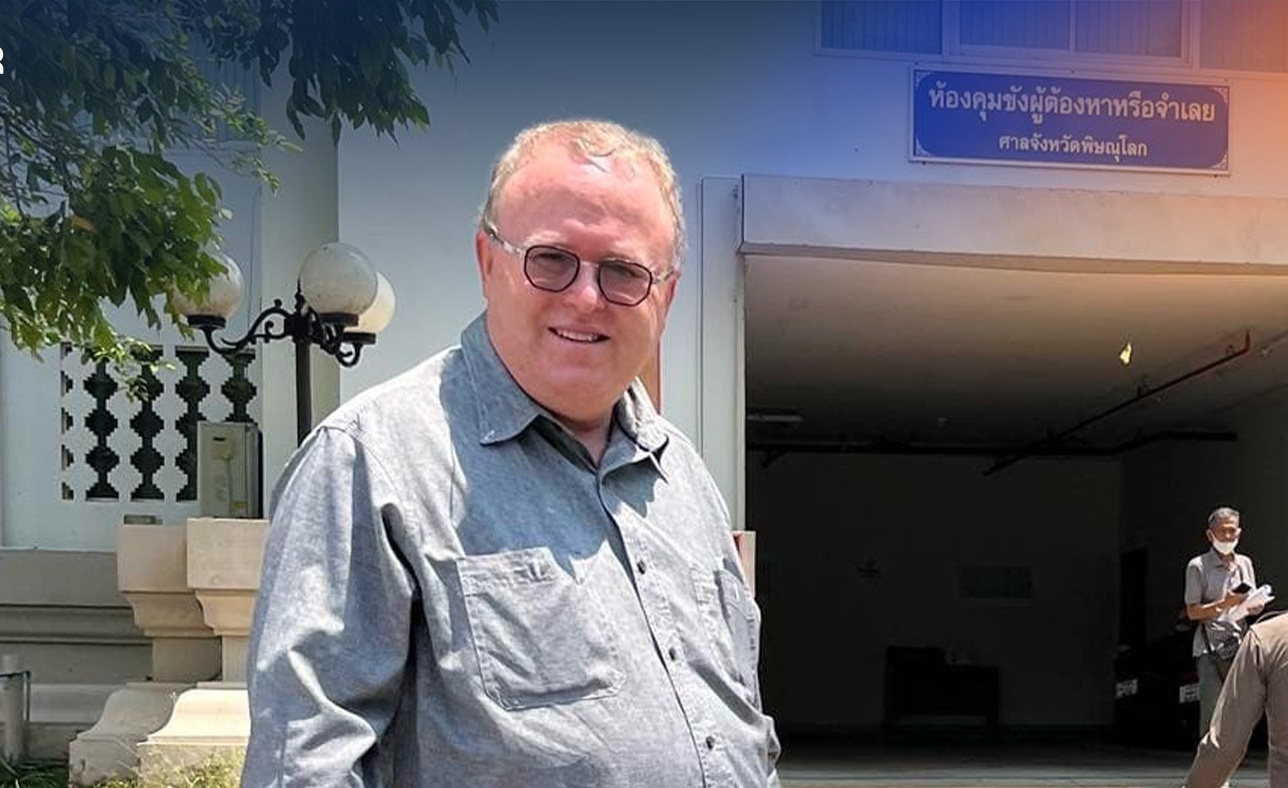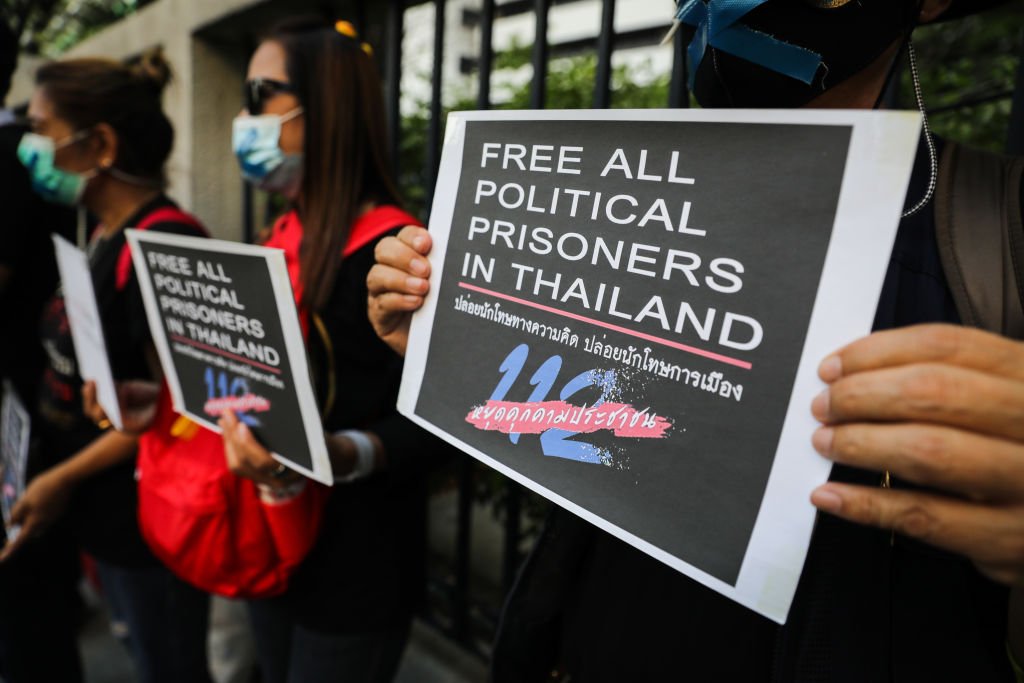American scholar, Dr Paul Chambers a lecturer and special advisor on International Affairs at Naresuan University, has been imprisoned after the court denied bail on Lese-Majeste Charges in northern Thailand’s Phitsanulok province. His legal team has filed an appeal.
Dr Paul Chambers was taken to Phitsanulok Provincial Prison following the court’s decision to reject bail for the second time. He is facing charges under Article 112 (Lese-Majeste) and the Computer Crime Act.
According to Mr Yaowalak Anupan, head of the Human Rights Lawyers Centre, the court cited three reasons for denying bail: the severity of the punishment, Dr Paul’s status as a foreign national, and objections from the investigation team.
Some believe its politically motivated after Thailand was hit with 36% export tariffs by the United States.
The lawyer explained that while the court viewed Dr Chambers as a n American citizen, alternative measures such as passport suspension and added conditions could have been imposed. During the initial bail request, the Assistant Dean of the university had acted as guarantor.
Dr Chambers has a stable residence and has shown no attempt to flee.
When he learned of the arrest warrant, he voluntarily came forward to acknowledge the charges and initially offered bail of 150,000 baht. However, the court denied the request.

In a subsequent attempt, the bail amount was raised to 300,000 baht, but the court upheld its decision, stating there was no reason to alter the prior ruling. As a result, Dr Chambers was sent to prison on the same day.
Mr Yaowalak noted that the case stemmed from a complaint filed by military officials, authorised by the 3rd Army Region, with Phitsanulok City Police. The complaint involved content on the website of the ISEAS-Yusof Ishak Institute in Singapore.
Dr Chambers denied responsibility for posting or writing the material, explaining that he was not an admin of the website.
In response to questions about the immediate issuance of an arrest warrant without prior summons, authorities argued that the case involved a potential sentence exceeding five years, justifying the warrant.
However, cases linked to political issues since 2020 have rarely started with arrest warrants. Typically, suspects are summoned first, even in cases with more serious allegations.
Dr. Chambers lawyer expressed concern about the court’s decision, highlighting that Dr Chambers is an academic, and the website in question belongs to a Singaporean research institute. This situation, she said, could impact freedom of academic expression.
She added that officials should have investigated the institute further, as Dr Chambers did not post the content on his personal social media.
On Monday, the U.S. Department of State expressed concern over reports of his arrest and confirmed it was offering consular support.
“We consistently call on Thai authorities, both privately and publicly, to uphold freedom of expression in line with Thailand’s international commitments,” a spokesperson stated.
Chambers, earned a PhD in political science from Northern Illinois University, is widely recognized for his expertise on civil-military relations and democracy in Asia, with a particular emphasis on Thailand. He has been based in Thailand since 1993.
He is the author of several books, including Khaki Capital: The Political Economy of the Military in Southeast Asia and Praetorian Kingdom: A History of Military Ascendancy in Thailand.

Lese-Majeste in Thailand: An Overview
In Thailand, Lese-Majeste refers to the offense of insulting, defaming, or threatening the king, queen, heir, or regent. This is outlined in Article 112 of the Thai Criminal Code. The law, introduced in 1908, carries prison sentences ranging from three to fifteen years per violation.
It is one of the harshest laws of its kind worldwide and underscores the monarchy’s importance in Thai society. The constitution describes the king as being in a position of “revered worship” and immune from accusation or violation.
The law’s wording is broad and unclear, as it does not specify what qualifies as an insult. This vagueness gives room for wide interpretation and has often led to its use in silencing political dissent.
How the Law is Applied
Lese Majeste in thailand can be filed by anyone, and law enforcement is required to investigate. Cases are often handled behind closed doors, sometimes in military courts, where defendants face limited legal protections.
Bail is typically denied, and multiple charges can lead to sentences lasting decades. For instance, in January 2024, a man was sentenced to 50 years in prison for comments about the royal family.
Enforcement of the law has often increased during times of political unrest. Following the 2014 military coup, prosecutions surged under the military-aligned government.
Critics, including the United Nations, argue that the law suppresses free speech and disproportionately targets activists, journalists, and ordinary citizens. Some cases are based on minor actions, such as liking a social media post or criticizing historical monarchs.
Challenges to Article 112
Calls to reform or repeal Article 112 lese-majeste laws have gained momentum in recent years. In 2020, youth-led pro-democracy protests openly challenged the law, breaking a cultural taboo. Protesters demanded its abolition along with broader political reforms.
Since that time, more than 270 individuals have been charged under the law. Activist Arnon Nampa, one of the most prominent figures, has received cumulative sentences totaling over 18 years as of late 2024, highlighting how severe the penalties can be.
Efforts to change Article 112 have faced strong resistance. The Move Forward Party, which won the most votes in the 2023 election and supported reforming the law, was blocked from forming a government.
In August 2024, the Constitutional Court dissolved the party, ruling that its stance on Article 112 was unconstitutional. This decision has reinforced the challenges of achieving political change, despite growing support for reform, especially among younger generations.
Related News:
Arnon Nampa Faces More Prison Time For Insulting King

Geoff Thomas is an award winning journalist known for his sharp insights and no-nonsense reporting style. Over the years he has worked for Reuters and the Canadian Press covering everything from political scandals to human interest stories. He brings a clear and direct approach to his work.














